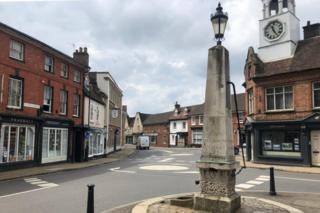Ampthill: The town with one cash machine for 8,000 people

The Georgian town of Ampthill has centuries of history, an active market and most of its shops are independent. What it no longer has, however, is a bank branch. Is it still cash-dependent or ready to become a contactless town?
Not long ago there were two banks with branches in Ampthill. Then there was one. Now there is none. Currently just one cash machine is left to serve a population of more than 8,000.
Today, the town was named as one of eight locations across the UK to take part in the Community Access to Cash Pilot, which will test new subsidised cash machines and local cash deposit centres for retailers.
For the residents and businesses of the Bedfordshire town, the shortage of cash machines is a significant issue.
Ezequiel Gomez-Gibson, manager at Cambridge Wine Merchants, said «a lot of people had talked about» the issue of withdrawing cash in the town.
«There is a lot of frustration about it,» he said. «Especially amongst the independent shops. We used to have a cash machine right next door to us and that disappeared. A lot of the time the ATM at the Waitrose runs out of cash.
«I understand people are using more contactless payments now but people still use cash – probably about 20% of our customers still use cash.
«A lot of our wines are between £7 and £8 and a lot of people will pay cash for those kind of wines. It is getting harder for them.»
So much harder, says 74-year-old Mary Kershaw, that she referred to herself and fellow residents of Ampthill as cashflow «inmates».
«I do use a card for big purchases but you cannot avoid using cash,» she said. «I do like using cash because you can see it, you can see what you’re doing and you can see how it is disappearing from your purse and there are times when that’s the only way you can do things.
«There’s time for cash and there’s a time for a card.»
But it is not just older people who often prefer cash to cards. Brandon Wilson, 20, is currently on furlough from a civil engineering apprenticeship at Luton Airport.
He said using cash helps him stick more rigidly to his spending plans to ensure he does not spend beyond his means.
«In general I try and budget my daily routine and having the physical money there means it is harder to spend than just placing a piece of card on to a machine.
«I play a lot of pool down the pub and you can’t pay for a game of pool by card. When I go for a night out, I will take out a certain amount of money and it will have to last me so that I don’t overspend.»
He puts all of his loose change into a tub and every three months he takes it to a bank to deposit the money in his account.
You might also be interested in:
While the government guidance for shops does not explicitly recommend taking card-only payments, it does mention the benefit of contactless transactions in reducing the risk of coronavirus transmission.
Claire Woodend, owns Ampthill Deli and Kitchen, said before lockdown about half of her takings were in cash. In the first week of reopening, only 5% of payments were cash, she said.
She expects that figure to rise in the future but said she would be surprised if cash takings ever again accounted for half of the business’s income.
«I think people are still worried about handling money and they like just to tap the card or use their phones and then we can wipe our machine,» she said.
«But hopefully, as people start feeling safer, people will start using more cash.»
The town’s bid for the cash pilot was put forward by its mayor, Ian Titman, who described the Waitrose cash machine as «ground zero» for Ampthill’s cash supply.
«But that does run out of money [and] 71% of the businesses here are independents. We’ve also got a mature population and, of course, not all of them want to use online banking or contactless payments,» he said.
Not only do customers want to pay cash for items – especially on Thursdays when the town’s 800-year-old market is in full swing – but businesses receiving cash need to be able to give change in return.
And at the end of the day, when the takings have been counted, where do those business owners take their money? They have to head out of town to the nearest bank, which is two miles (3km) away in neighbouring Flitwick.
The mayor hopes the Access to Cash Pilot will deliver some form of banking hub for Ampthill. But where could such a hub be built?
Mr Titman has an idea.
«It would need to be set up in a building and we still have the NatWest building which closed three years ago. And it is currently empty.»


